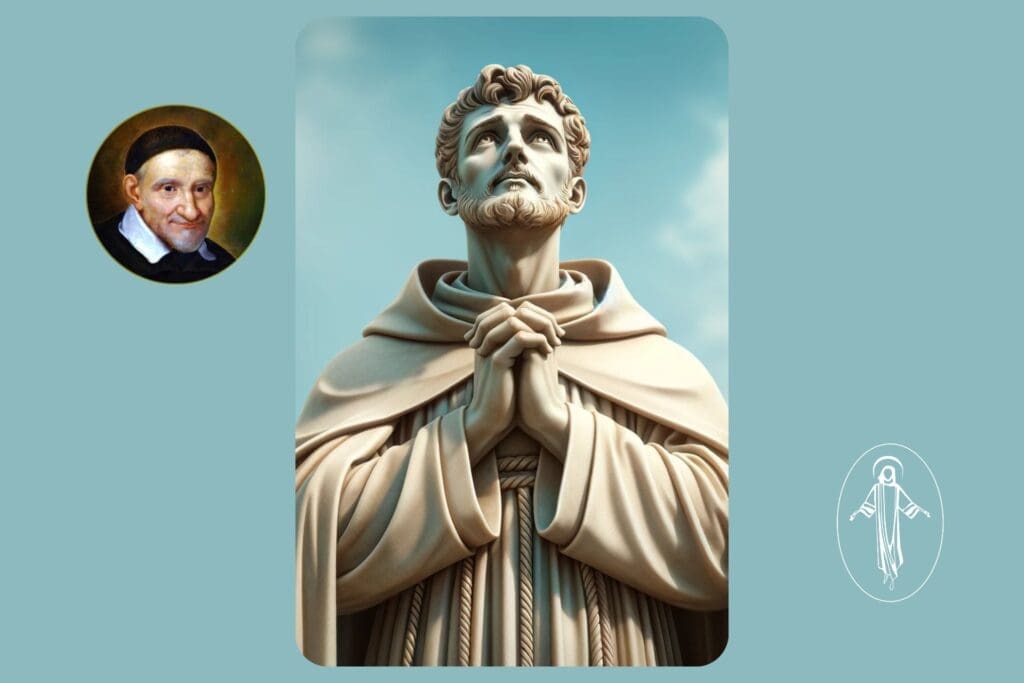Preparation
In explaining his method for meditating, Vincent described the first step in this way: It is most important to place ourselves firmly in the presence of God, for the very core of meditation depends on it. Once that is done, the rest falls into place.
To benefit from mental prayer, a certain degree of silence is necessary to hear the voice of God. In this regard, Vincent alluded to the words of the Imitation of Christ: In silence and quiet, the devout soul goes forward and learns the hidden things of the Scriptures.
He insisted on the importance of retiring at an appropriate hour the night before.
Vincent spoke of two types of preparation: a) proximate preparation, made immediately before beginning the morning meditation; b) remote preparation, done the night before. The latter consists of selecting some points for the following day’s meditation and falling asleep with a good thought about the theme chosen. Then in the morning:
Place yourself in the presence of God
Vincent borrowed his method for mental prayer from Saint Francis de Sales who stated that we can place ourselves in the presence of God in four ways: 1) contemplating him in the Blessed Sacrament, 2) reflecting on the joy of seeing God adored in heaven, 3) affirming that God is everywhere, and 4) recognizing that God is present in those who allow themselves to be captivated by his love.
Ask for the grace to pray well
We ask for divine assistance to open ourselves to the movement of the Holy Spirit, “our internal teacher.” Vincent himself used the following prayer: O Savior, you know what my heart wants to say. It turns to you, fountain of mercy. You see its desires. They tend only to you. They aspire only to you. They want only you. Let us say often, “teach us to pray.”
Faith assures us that we pray in the communion of saints. In this context, Vincent counseled us to invoke the intercession of the Blessed Mother, of our patron saint, or of our guardian angel.
Recall or select a theme
Special attention should be given to the humanity of Christ; that is, his life, his mission, and his teachings, allowing oneself to be surprised and inspired by Jesus’ words and example. Vincent was particularly fond of meditating on the gospel passages that the Church proposes for liturgical celebrations.
The Body of Prayer
Reflect on the theme chosen (a mystery, a virtue, a gospel saying), trying to discover its deepest meaning. Vincent recognized the risk of making mental prayer an intellectual exercise. The method he proposed harmonizes reason, emotion, and will. He exhorts his followers to use the three steps of his “little method” to enter into an affective dialogue with the Lord, opening our heart to whatever God’s word asks of us.
1st Step: NATURE (What?)
What does this mystery in Jesus’ life mean for me? What does this virtue, this event, or this gospel saying challenge me to do? What vice or addiction is mentioned that I should avoid?
2nd Step: MOTIVES (Why?)
What are the reasons that encourage me to live this mystery, to live out this gospel saying, to acquire this virtue, or to avoid this vice? Convince yourself of the value of the matter in question.
3rd Step: MEANS (How?)
Make a resolution: How should I put into practice what I have reflected on in prayer? In view of my mission and my community, how might I enter more fully into the mystery I meditated on, or grow in a virtue, or avoid a vice, or practice a gospel saying? I might also resolve to invest time in projects that meet the needs of the people I serve or in working with them to change unjust societal structures. In this third step, it may also be useful to highlight a word or phrase that I can recall during the day to motivate me to live out my resolution.
Conclusion – Thank God for this time of prayer
Vincent instructs us: In closing, let us thank God for the lights and graces He has granted us during meditation, and for the resolutions he has inspired us to make. Let us also ask Him for his help to be able to put into practice as soon as possible whatever we have proposed to do.
Reviewing our resolutions – Examination of Conscience
Our Vincentian tradition provides for two forms of examination: 1) the Particular Examination, usually done around noon, and 2) the General Examination, done at the end of the day.
- In the Particular Examination, we reflect on the day’s resolution and on how we have implemented it.
- In the General Examination, made at night before going to bed, we reflect on the past day, thanking God for the gifts we have received and asking forgiveness for failures.
Sharing our thoughts
Vincent strongly recommends the Repetition of Prayer or sharing our prayer with others.
A word on contemplation
Mental prayer often leads to an experience of contemplation. Vincent, who was a true mystic of charity, tells us that contemplation is a gift from God and a frequent result of a mature spiritual life. During a conference with the Daughters of Charity, he described the experience of contemplation: In this, the soul, in the presence of God, does nothing but receive what God gives. It does not act and, with no effort on the part of the soul, God himself inspires it with everything it may be seeking, and much more. Haven’t you ever experienced this sort of prayer …? I’m sure you’ve done so very often in your retreats, when you’ve been amazed that, with no contribution on your part, God himself filled your mind and imprinted on it knowledge that you never had.



Wonderful review of St Vincent’s insight into mental prayer. This was a helpful reminder of our tradition in this important area.